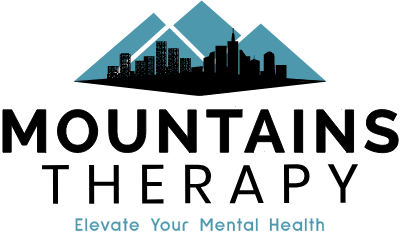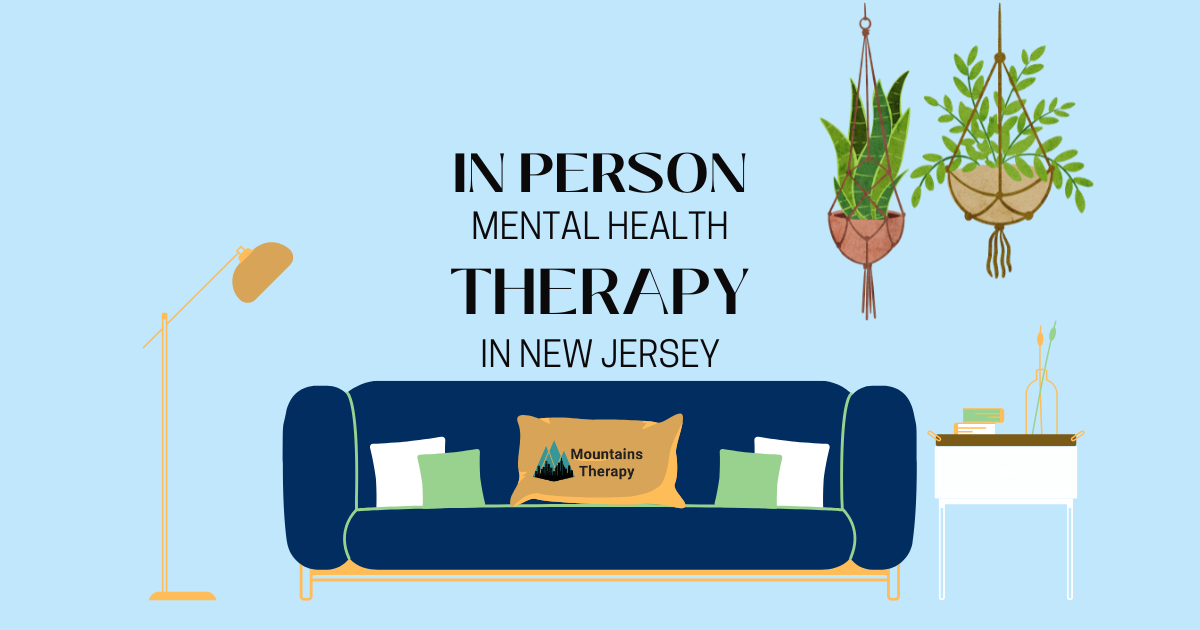In-Person Therapy in Montclair, NJ: Advantages, Types of Therapy, and Getting Started
Learn more about In-Person Therapy in Montclair, NJ.
In This Blog, You’ll Learn
At Mountains Therapy in Montclair, NJ, you’ll discover:
- What in-person therapy is and why it may be right for you
- The advantages of choosing in-person sessions over online therapy
- How long in-person therapy usually lasts and what to expect in session
- Practical tips on how to prepare for your first in-person appointment
- Answers to common mental health questions, including serious mental illnesses and psych holds
- The types of therapy offered at Mountains Therapy and how they can help with anxiety, depression, trauma, relationships, and more
What Is In-Person Therapy?
In-person therapy means meeting face-to-face with your therapist in a private, calming office. This form of therapy allows for direct communication, non-verbal connection, and a safe, structured space for healing. Many clients wonder: What is in-person therapy? Simply put, it’s the traditional model of counseling that prioritizes real-time, in-person connection. At Mountains Therapy, we provide in-person therapy in Montclair, NJ for children (ages 6+), teens, adults, couples, and families.
How Long Does In-Person Therapy Usually Last?
Most sessions last 45–60 minutes, depending on the type of therapy. Some clients benefit from shorter, more frequent sessions, while others may attend weekly or bi-weekly meetings. A common question is how long should I keep the same therapist? The answer depends on your personal goals and comfort level—some clients stay with the same therapist for years, while others transition after progress has been made.
Our In-Person Therapy Services
At Mountains Therapy in Montclair, NJ, we offer in-person sessions for a variety of needs, including:
- Intake Session for All New Clients – 60 minutes
- Individual Therapy in Montclair, NJ – 45 minutes
- Couples Therapy in Montclair, NJ – 60 minutes
- Marriage Counseling in Montclair, NJ – 60 minutes
- Family Therapy in Montclair, NJ – 60 minutes
- Therapy for Adults in Montclair, NJ – 45 minutes
- Therapy for Kids & Teens (ages 6+) in Montclair, NJ – 45 minutes
- Online Therapy in Montclair, NJ– same session lengths as above, available in NJ, NC, FL, and UT
Is Therapy Better Online or In-Person?
Clients often ask: Is therapy more effective in-person? or Is therapy better online or in person? The truth is, both approaches are effective. However, in-person therapy offers unique advantages:
- Stronger non-verbal connection through body language and presence
- Structured, distraction-free environment
- Easier to build deep trust and accountability
Online therapy is equally valid and convenient, especially for busy schedules or remote clients, but many people prefer in-person sessions for the personal touch.
What Are the Advantages of In-Person Therapy?
Some key benefits include:
- Safe Environment: A private office designed for comfort and healing
- Focused Sessions: Fewer distractions than at home
- Deeper Connection: Greater ability to read emotions and body language
- Routine: Committing to an office visit can help with accountability
Check Out Our In Person Therapy Offices in Montclair, NJ
Our Montclair, NJ office is designed to be a calm, welcoming space where you can feel comfortable and supported from the moment you arrive. From cozy seating to a private, quiet setting, every detail is meant to help you feel at ease.
How Can I Prepare for In-Person Therapy?
Preparing for your session can help you feel more grounded:
- Write down thoughts or goals before the session
- Use headphones or sound machines at home to reduce stress before/after therapy
- Practice breathing or mindfulness before arriving
- Bring questions or reflections you’d like to discuss
How to Tell If In-Person Therapy Is Working
You may notice:
- Improved mood or reduced symptoms
- Better coping strategies for stress
- Feeling more understood and supported
- Stronger relationships and communication
Greater sense of hope and progress
Understanding Mental Health Terms
Some clients bring up broader mental health topics in therapy:
- What are considered serious mental illnesses? Conditions like schizophrenia, bipolar disorder, and severe major depression.
- What happens after a 72-hour psych hold? Also called a 5150 hold, it’s a temporary hospitalization for safety. Afterward, patients may be released, referred for outpatient care, or extended treatment.
- What is a T3 in mental health? T3 can refer to thyroid hormone levels often checked during evaluations, as thyroid function impacts mood and energy.
- What Are the Three Types of Therapy?
- There are many approaches to therapy, but traditionally, they are grouped into three main categories:
What are the three types of therapy?
1. Psychodynamic Therapy In Person
Explores past experiences, unconscious patterns, and how early relationships shape current behavior. At Mountains Therapy, this includes:
- Psychodynamic Therapy - helps with self-awareness, unresolved trauma, and long-term relational patterns.
- Attachment-Based Therapy - supports healing attachment wounds, improving communication, and building secure relationships.
- Trauma-Informed Approaches – assist with processing difficult life events, childhood trauma, and relational struggles.
- Trauma-informed approaches that explore childhood and relational patterns
2. Behavioral Therapy In Person
Focuses on present behaviors and practical solutions for change. At Mountains Therapy, this includes:
- CBT – Cognitive Behavioral Therapy – helps with anxiety, depression, stress, and replacing negative thought patterns with healthier ones.
- DBT – Dialectical Behavioral Therapy – effective for emotion regulation, building healthier relationships, and supporting those with borderline personality disorder.
- TF-CBT – Trauma Focused CBT – designed for children, teens, and adults to process trauma, PTSD, and difficult life experiences.
- SFT – Solution Focused Therapy – short-term and goal-oriented, focusing on strengths and practical solutions to current challenges.
- MBT – Mindfulness-Based Therapy – reduces stress and anxiety by teaching awareness, grounding, and present-moment focus.
3. Humanistic Therapy In Person
Emphasizes personal growth, self-acceptance, empowerment and strength-based and empowerment-focused therapies. At Mountains Therapy, this includes:
- EFT – Emotionally Focused Therapy – supports couples, marriages, and families by deepening connection and resolving conflict.
- ACT – Acceptance Commitment Therapy – helps people accept difficult feelings, build resilience, and take actions aligned with their values.
- Narrative Therapy – allows clients to reframe and rewrite their personal stories to foster healing, self-identity, and empowerment.
At Mountains Therapy in Montclair, NJ, we tailor therapy to fit each client’s needs—whether you’re an individual, couple, child, teen, or family. By combining traditional frameworks with modern, evidence-based treatments, we help clients build resilience, improve relationships, and heal from trauma.
Take the First Step and Start Therapy
If you’re asking yourself What is the most effective way of therapy? or Are People Who Go to Therapy More Successful? Remember: the best therapy is the one that fits your needs. For many, that means face-to-face connection. Mountains Therapy in Montclair, NJ, is here to guide you through healing, whether in-person or online. Book your in-person therapy near me in NJ today.















